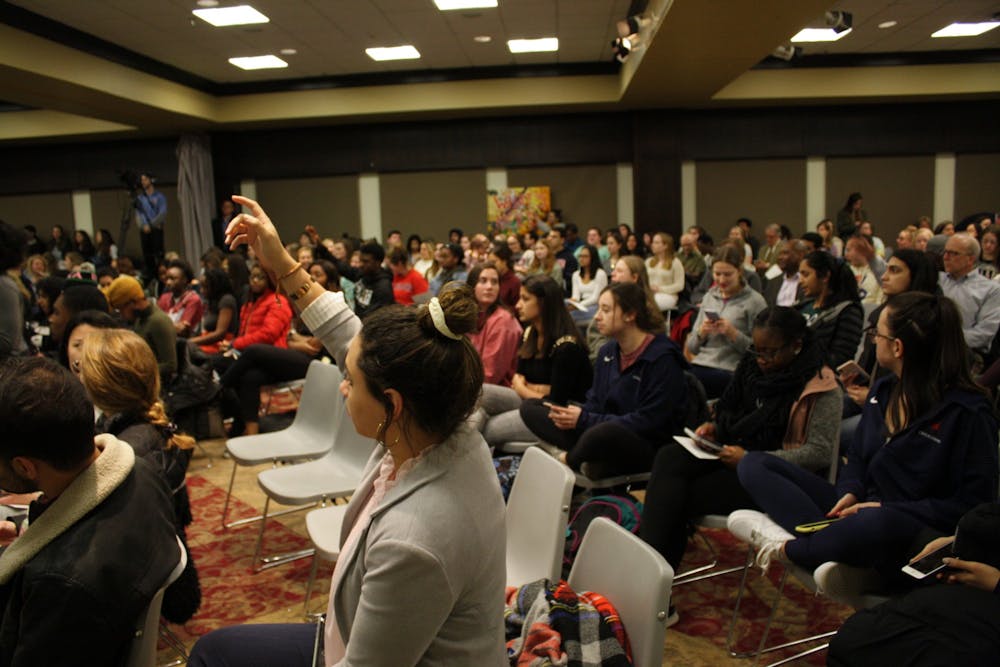Several students shared their experiences Thursday evening at a community meeting called in response to the recent racist incidents on campus, as well as what many called a “long-running culture” of racism fostered both within the University of Richmond and the U.S.
Around 450 students, faculty members and staff members gathered at 6 p.m. in the Alice Haynes Room in Tyler Haynes Commons for the event, formally titled “No Room for Hate.” More than 200 others gathered in overflow spaces in the Commons to watch the event, which was also livestreamed, said University President Ronald A. Crutcher, who called for Thursday’s meeting.
“I want you to know, how — and my wife will get upset with me if I use an expletive — but I’m really angry. I’m mad as hell,” Crutcher said. “Because we’ve been working really, really hard at this university to assure that everyone who comes here, regardless of what country they come from, what part of this country they come from, what their race is, what their sexual orientation is — whatever — that everyone can thrive here at the University of Richmond.
“When things like this happen, it makes me realize how much more work we have to do.”
Campus leaders such as Keith McIntosh, vice president for Information Services and chief information officer; Glyn Hughes, director of the Office of Common Ground; Mia Reinoso Genoni, dean of Westhampton College; and Patricia Herrera, a theater professor and member of the Interim Coordinating Council for Thriving, Inclusion, Diversity and Equity, helped moderate the discussion.
The leaders stressed that they wanted to hear from students only, even asking faculty members and staff members to move back and let students take the front rows instead.
“I’m here with my facilitators, and we want to say something right now, very clearly,” Genoni said. “We know that we have failed, and that we have to do better, and that is why we are here tonight.”
Students shared their stories in two-minute increments, calling for action from the administration and student body.
Many students discussed how they thought that UR’s marketing had encouraged them to attend the university by promising that diverse and welcoming communities had been established on campus.
But when they actually arrived, they found a different reality.
“Why is it that we are being treated as an add-on, instead of an important, and integrated, part of this campus?” said first-year Elijah Michel. “I am sick and tired of being tokenized. I’m sick and tired of being marketed on the website of Richmond so that we can get more people of color to come to our school so we can fill our racial quotas.”
Speakers said they had struggled to seek out safe places or students and professors who looked like them and whom they felt they could relate to. Students called out UR’s administration, questioning why the students were the ones held responsible for having to create such communities.
Enjoy what you're reading?
Signup for our newsletter
Many shared that they had encountered racism as early as their first year at UR, some even during new student orientation week.
Multiple students also named the E. Claiborne Robins School of Business, Greek life and rooms in the dining hall as spaces on campus that they constantly felt were segregated and unwelcoming.
“The biggest problem I see in this university is white Greek life,” said sophomore Manomay Modi. “You guys go to your sororities and your fraternities with your white friends, you chill with your white friends, you sit in D-hall with your white friends, you go to the library, sit with your white friends, and you just chill with them. And you don’t give zero f---s about what we are up to.”
There is a failure within the campus community to recognize white privilege and subtle racism, said Ken Anderson, a 2017 Richmond College alumnus and current third-year law student at the T.C. Williams School of Law.
“It is a weird thing to be in a place for seven years, and you just see that nothing has really changed,” Anderson said. “It is infuriating that I'm about to leave this place, and I came here at the beginning of this decade, and I still see the same stuff.”
A concern brought up among several of the speakers was how to reach members of the community who were not in attendance at Thursday’s event.
“Someone said it earlier tonight — the people who really, really need to be here weren't,” said junior Chris Barry after the event. “How do we get the people who don't care to care? How do we make this something important to them?”
At the beginning of the meeting, Hughes had noted that discussion leaders would be documenting everything that they heard at the meeting and sharing it back in a “public way” next week, Hughes said.
Students proposed possible solutions such as more diverse syllabi and more content about race built into the general education curriculum and new student orientation.
“It’s on that foundation of our collective listening and comprehending those experiences that we can start to build a path toward action,” Hughes said.
Herrera echoed this sentiment.
“Our students who are most affected, including students of color, international students and students from underrepresented religious groups are saying loud and clear, ‘We will be heard,’” Herrera said. “There’s still so much to say and still so much listening to do. We hear you, and we want to continue to listen to you.”
Contact news writer Eileen Pomeroy at eileen.pomeroy@richmond.edu and editor-in-chief Jocelyn Grzeszczak at jocelyn.grzeszczak@richmond.edu.
Support independent student media
You can make a tax-deductible donation by clicking the button below, which takes you to our secure PayPal account. The page is set up to receive contributions in whatever amount you designate. We look forward to using the money we raise to further our mission of providing honest and accurate information to students, faculty, staff, alumni and others in the general public.
Donate Now



